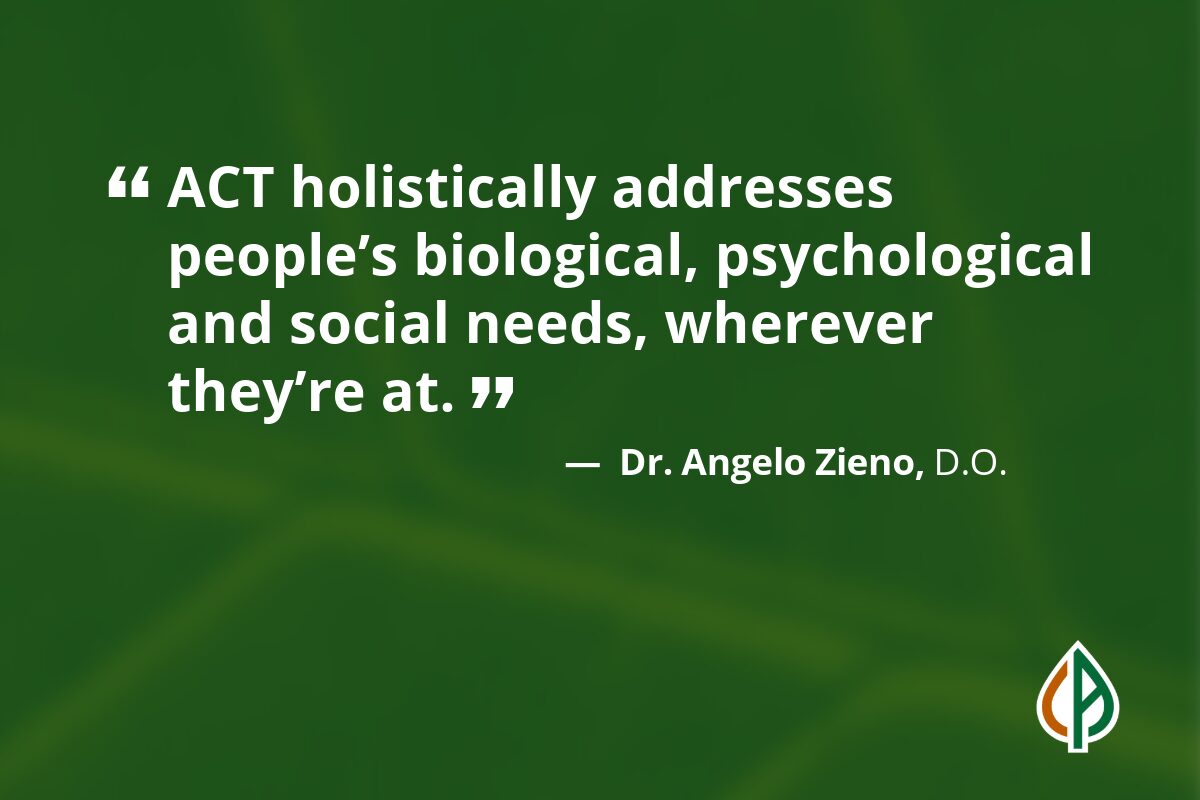Bridging gaps in care: the decades-long impact of Community Alliance’s Assertive Community Treatment program

Community Alliance was founded to address the needs of our community. Since our inception in 1981, we have continually implemented evidence-based, nationally recognized models at a local level to help people access the mental health and recovery resources they need to thrive here.
In line with this commitment to provide integrated care to our community, we established our Assertive Community Treatment (ACT) program in 1998 to fill critical gaps in our area. Over the past several decades, the program’s wraparound services have helped many individuals experiencing symptoms of psychosis make real progress toward independent living and avoid rehospitalization or reincarceration.
Meeting people where they are
When someone leaves the hospital after an episode of psychosis, the path to independence can be overwhelming. They may need to manage medication, attend outpatient appointments, find employment and more. Missing a few appointments can lead to being dropped as a patient and losing access to medication, increasing the likelihood of rehospitalization.
That’s where ACT steps in. Our multidisciplinary, coordinated team bridges rehabilitation and treatment with a psychiatrist, nurse, therapist, substance use specialist, psychiatric rehabilitation specialist, vocational specialist and peer support specialist — all dedicated to meeting people where they are and making positive progress possible.
“We provide all components of rehabilitative care and help manage its logistics,” said Dr. Angelo Zieno, D.O., M.S. “ACT holistically addresses people’s biological, psychological and social needs, wherever they’re at.”
Unlike typical community support programs, ACT increases access to resources and support through a flexible service-delivery model. In the majority of ACT interventions, we bring service to the individual and do not expect them to come to Community Alliance. If someone needs their medication delivered or prefers to meet with specialists at their home or workplace, the ACT team is there for them. Members of the ACT team may see a person multiple times a week if and as needed. ACT is the only community-based program that provides frequent service interventions in the community through a highly professional team.
“Maintaining that line of care is very important to us,” said Jessica Dean, MSW, LIMHP. “If someone can only meet in their car during a work break, we’ll be there. That’s the ‘assertive’ part of Assertive Community Treatment. We’re meeting individuals where they’re at and proactively addressing their needs.”
How ACT changes lives
Our ACT team is dedicated to helping people who struggle to progress toward their goals as they strive to live and be a part of the broader community. The team provides flexible, frequent and specialized support that isn’t available through a standard outpatient provider.
“We’re taking the time to deeply assess individuals’ situations, reviewing what’s working and what’s not with their treatment plan,” Dr. Zieno said. “For example, someone may stop a medication because they have a difficult time getting to the pharmacy for refills, or the medication may create unpleasant side effects. We’re able to catch things very quickly that are creating barriers to help people move in a healthier direction.” The team meets every day to discuss any changes in goals or in its approach to better meet individuals’ needs.
While ACT support is intensive, the team focuses on individual empowerment and incremental independence, working with each person to define their own success and become increasingly responsible for their care.
“We’re not doing things for people or telling them what to do. We’re asking them what they want, using motivational interviewing and implementing harm-reduction techniques,” Jessica said. “One person’s level of independence will look different from another’s. We understand an individual’s baseline and work with them to be as successful as possible independently. That’s also what we mean when we say meeting people where they’re at. It’s not just physical; it’s meeting them where they are in their lives.”
On average, individuals who have been involved with ACT at Community Alliance can independently manage their care after approximately two years. We are proud to have made a difference in the lives of hundreds of community members.
If you’re looking for a work environment where you can make a difference every day, check out Community Alliance’s available positions for behavioral health therapists, rehabilitation specialists, peer support specialists and more.



